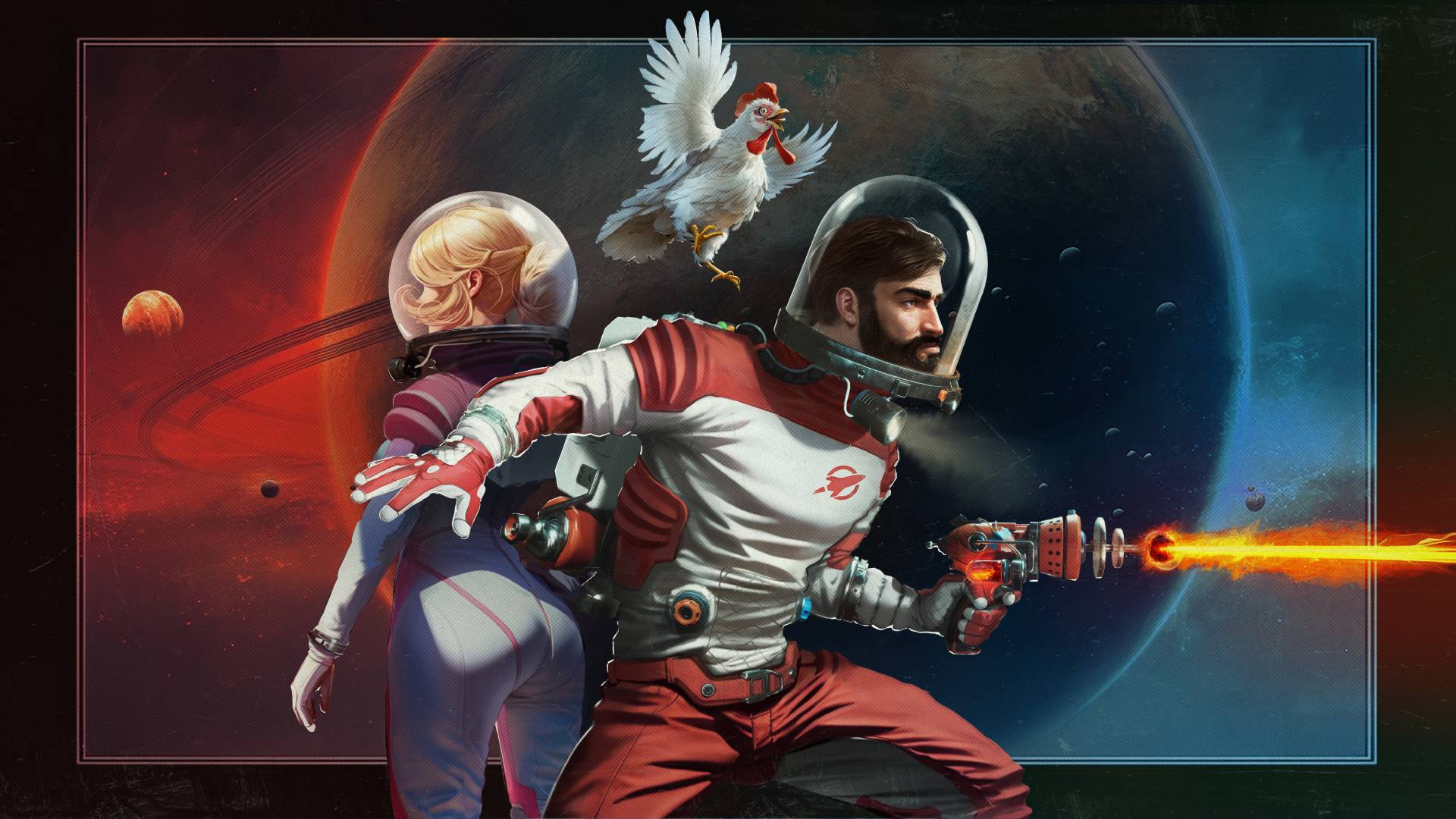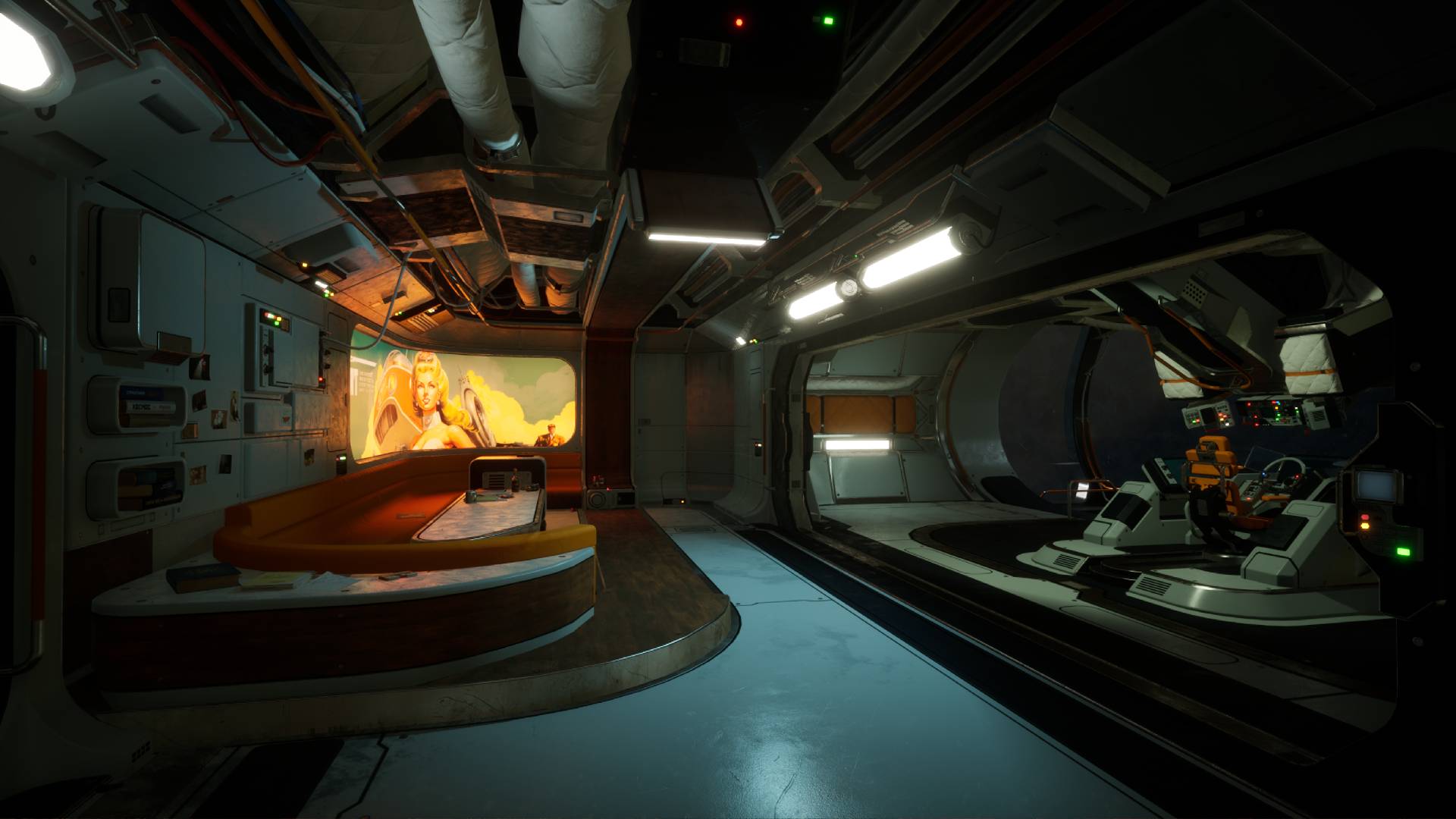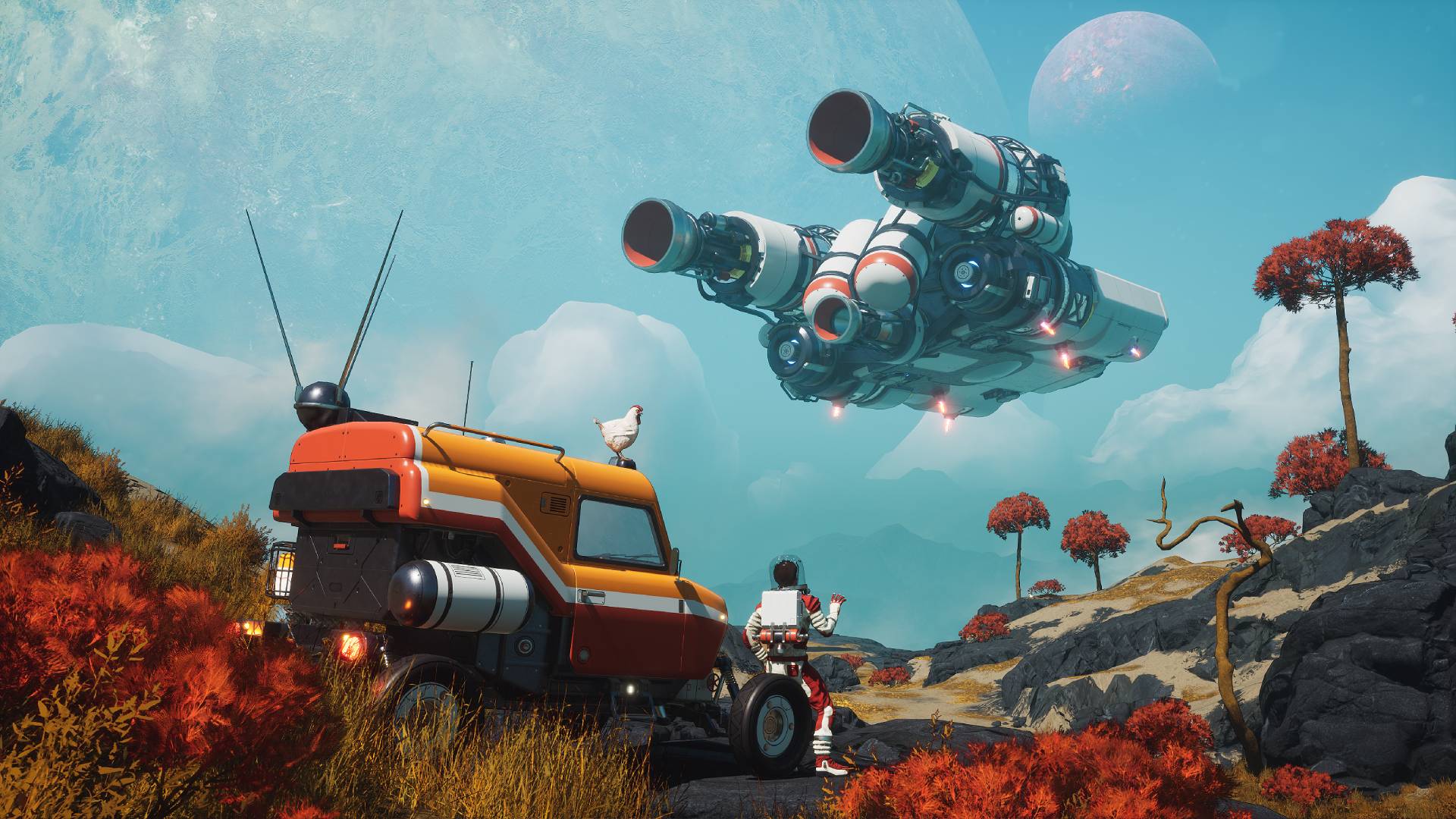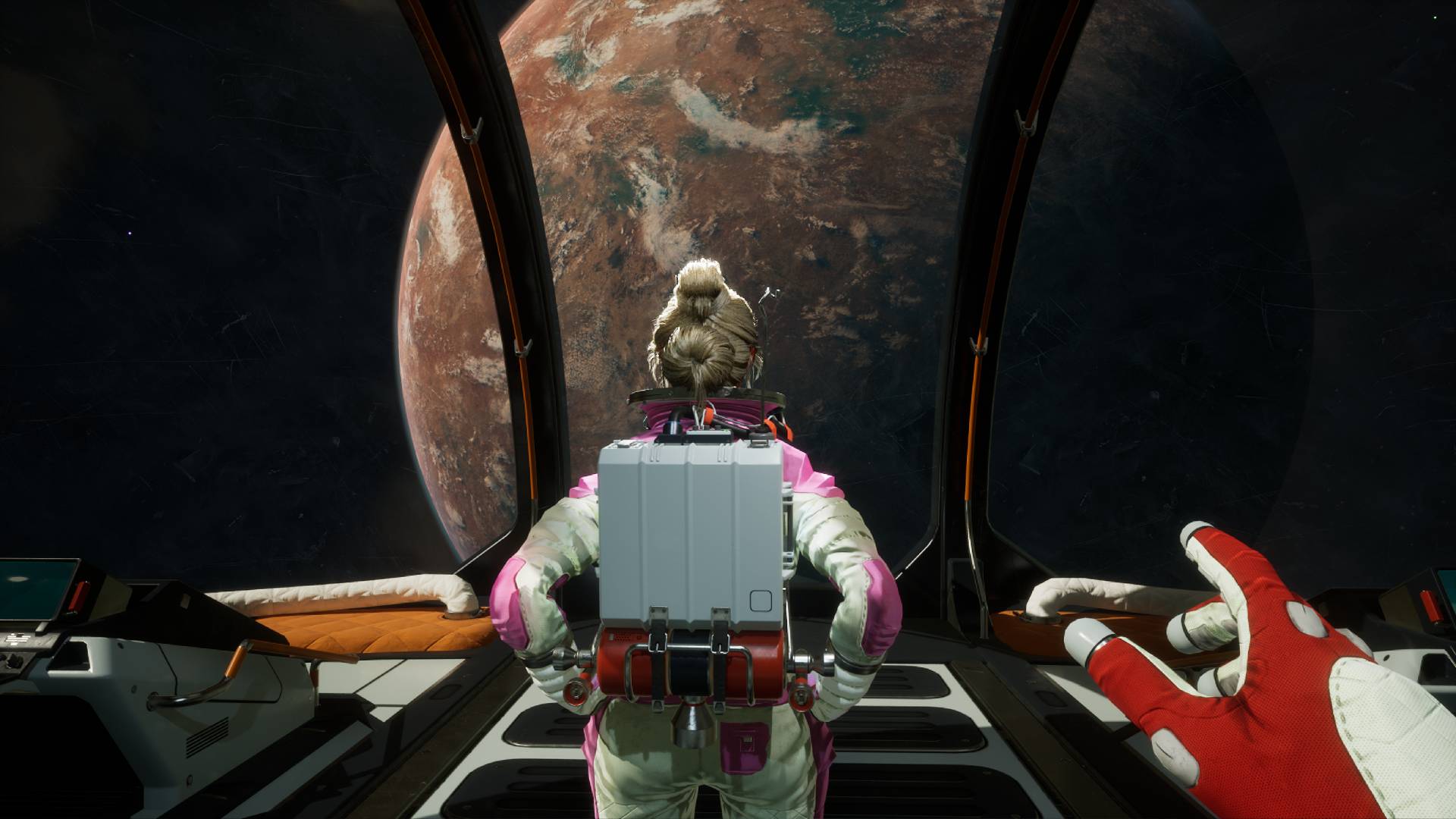
Space can take itself a little too seriously, can't it? 'Ooh, look at me in all my incalculable vastness, bow down to my incomprehensible astrophysical phenomena'. Get over yourself. It’s about time a game like Breathedge 2 came along and treated the outer limits of our explorable domain with the derision it deserves.
Because when faced with the true nature of our place in it, the random bloody chance of existing at all, let alone making a decent job of it and having an alright career and clean laundry and friends, the only rational response is absurdism. Douglas Adams knew it, and so does RedRuins Softworks, back with another slice of uniquely hilarious space survival in Breathedge 2.
While the first game kept your abuse of an immortal chicken on a stick to fairly tight confines, given the setting, Breathedge 2 widens your explorable domain and toolset into proper sandbox territory.
"We indeed want to get rid of the forced wandering through the space gut," Redruins' Aleksandr Chicken Director says (I have my doubts as to whether that’s their real name), "which was one of the first part’s weak points.
"We would like the player to experience a more space-like cosmos, with the ability to aimlessly float around and collect debris wherever they want. It won't be a completely open world with honest flights between planets in the void, and certain resources, ship parts, or tools may be required for long-distance flights, but it won't be a corridor either, that's for sure."

In the first game, you played The Man on his humble mission to deliver his grandad's ashes to a galactic funeral, who soon found himself embroiled in sinister forces well beyond his control. Against all odds—although cards on the table, I’m not sure what the involvement of an immortal chicken does to any sense of mathematical probability—you survived and made it back home, where 240 years of hard labor awaited you by way of a reward.
Breathedge 2 picks up with The Man planning out a suicide mission to the furthest reaches of space so that he and his team can behead the coffin army hellbent on enslaving humanity, save the day, themselves, and the notion that even deeply, profoundly incompetent people can be heroes.
Firstly, we kindly separated the Chicken from that stick
Aleksandr Chicken Director
While the unmistakable tone's consistent and a precious gem to be nurtured by us all in the games industry at all costs, there are some notable evolutions to Breathedge 2's nuts and bolts. The Man's out there with a crew this time, and with more than just the aforementioned everlasting avian for company, there’s a totally different dynamic to your incompetent galactic questing.
"Firstly, we kindly separated the Chicken from that stick," Aleksandr says, "and it became a full-fledged participant in the events with its own mechanics. Secondly, the talkative spacesuit didn't go anywhere, even though it's no longer just a spacesuit.
"Fifthly, we were joined by the Babe, who will act as our navigator. And sixthly, the ship's crew can be expanded with other crew members joining."
I haven’t edited out the thirdly and fourthly, by the way. That’s just how Aleksandr answers a question.

If you disregard your team, your ship, and your duties as a captain, the team may do the same, and drowning won't be far behind
Aleksandr Chicken Director
Every member of your crew plays their role in your ship’s upkeep and aids your survival, he continues. They’re assets that you’ll need to pay attention to and nurture. "The team's mood directly influences the gameplay, the player's development, their actions, whether they help the crew members in their life difficulties, how they feed the chicken, and whether they clean the ship's filters," Aleksandr says. "If you disregard your team, your ship, and your duties as a great captain, the team may do the same, and drowning won't be far behind."
Space is a bigger place this time, and not made of (admittedly very entertaining) corridors as before. But Redruins Softworks isn’t delivering a galaxy simulator on the same scale as No Man’s Sky. You’re landing on planets, yes, but this isn’t one of those games where you can point to a speck on the horizon from your cockpit and land there minutes later. Many planets are impossible to land on or simply don’t offer you an incentive or reward for doing so. That means the studio can keep planetary landing tight and make it feel special and bespoke each time.
“Each landing will be an event, a unique world with its own rules, resources, and opportunities to explore," Aleksandr says. "Biomes won't appear every 15 minutes and won't consist of endless kilometers of generative art. This allows us to focus on handcrafting each section of every planet, adding specific requirements, details, and mechanics."

The success of Redruins' first game has allowed the team to expand the scope of the original in myriad ways, from "new bugs" to a car boot in the vehicle you see in the reveal trailer and a reworked oxygen consumption system. This is all thanks to the support and feedback of the Breathedge community, Aleksandr tells me, both in terms of delivering specific quality-of-life requests and future nice-to-haves, and buying the first game in sufficient numbers to bankroll a more ambitious sequel.
We have gotten rid of the annoying mechanic of items breaking after a few uses
Aleksandr Chicken Director
But one of the biggest changes at this stage is to crafting. A common piece of feedback was that people didn’t enjoy the degradation mechanic of craftable items before, so "we have gotten rid of the annoying mechanic of items breaking after a few uses," Aleksandr says. "Now, crafting an item like a drill is a significant event." The item you craft will have relevance in the sandbox world; you can upgrade it and expand its usefulness. "But it won't be a lump of sugar that melts in your hands anymore."
And crafting's a two-way street. You can earn back materials by breaking down crafted items. "We will definitely add a mechanic for item disassembly," Aleksandr says. "If, for some reason, a lovingly crafted grenade no longer pleases the eye, it can always be dismantled for useful resources instead of just exploding in your hands."
There are specific tweaks to the crafting UI, including an item queue and swappable crafting windows, and there’s a real focus on keeping crafted items relevant throughout the game so that they don't just gather dust after their initial use. It's been a difficult journey, says Aleksandr.
"Of course, sacrifices had to be made for this, and we had to learn to count beyond five to fine-tune the balance, but that's what it takes. For the sake of the players, we'll go as high as seven. That's how it is."







